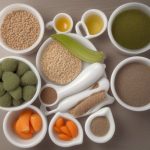Urinary discomfort, ranging from frequent urges to feelings of burning or incomplete emptying, can significantly impact daily life. While many factors contribute to urinary health – hydration levels, underlying medical conditions, and even lifestyle choices – dietary adjustments often play a crucial role in symptom management for some individuals. This article focuses on the potential benefits of incorporating more plant-based foods into your diet as one strategy to support a comfortable urinary experience. It’s important to remember that everyone is different, and what works for one person may not work for another. Consulting with a healthcare professional is always recommended when addressing persistent or severe urinary issues.
The connection between food and urinary health stems from several key areas. Certain foods can irritate the bladder, exacerbating symptoms like urgency and frequency. Conversely, other foods possess anti-inflammatory properties that may help soothe the urinary tract. Plant-based diets are naturally rich in compounds known to support overall well-being, including antioxidants, fiber, and essential vitamins and minerals. Moreover, reducing or eliminating common bladder irritants often found in animal products and processed foods can contribute to improved comfort. This isn’t about deprivation; it’s about making informed choices that prioritize your body’s needs.
The Power of Hydrating Plant Foods
Maintaining adequate hydration is fundamental for urinary health, but how you hydrate matters just as much as how much you drink. Plain water should always be the primary source of fluid intake, but incorporating hydrating plant foods can supplement this and offer additional benefits. Many fruits and vegetables boast high water content – think watermelon (around 92% water), cucumbers (96%), and berries (87-91%). These not only contribute to overall hydration but also provide essential vitamins, minerals, and antioxidants that support a healthy urinary tract. Electrolytes, lost through urination, are replenished by fruits like bananas and oranges.
Beyond simply increasing fluid intake, the type of fluids consumed can impact bladder sensitivity. Highly acidic beverages such as citrus juices, carbonated drinks, and caffeinated drinks are known bladder irritants for some people. Switching to herbal teas (like chamomile or dandelion – see below), infused water with cucumber and mint, or diluted fruit juice can be a gentler option. Focus on consistently sipping fluids throughout the day rather than consuming large amounts at once, which can put unnecessary stress on the bladder. Consistent hydration is key, but choose your sources wisely to minimize potential irritation. Learning about optimal urinary balance through hydration strategies can be very helpful.
Plant-based foods also help regulate fluid balance due to their fiber content. Fiber absorbs water, creating softer stools and reducing pressure on the pelvic floor muscles, which are essential for proper bladder control. A diet lacking in fiber can lead to constipation, placing added strain on these muscles and potentially contributing to urinary issues. Incorporating foods like oats, lentils, beans, and leafy green vegetables provides a natural way to support both digestive and urinary health.
Soothing Herbal Teas & Infusions
Herbal teas offer a delicious and gentle way to increase fluid intake while potentially offering additional benefits for urinary comfort. Chamomile tea is well-known for its calming properties and may help reduce bladder spasms. Dandelion tea, a natural diuretic, can promote healthy kidney function and flush out toxins – however, use with caution if you have existing kidney problems or are taking diuretics. Hibiscus tea boasts antioxidant properties and may contribute to overall urinary tract health.
It’s crucial to choose high-quality herbal teas from reputable sources and be mindful of potential interactions with any medications you’re taking. Start with small amounts to assess your tolerance, as even seemingly benign herbs can cause reactions in some individuals. Infusions – simply steeping fresh herbs in hot water – are another fantastic option. Mint, parsley, and ginger all have diuretic properties and can add a refreshing flavor to your hydration routine. For more information on choosing the right herbal infusions, explore herbal infusions for urinary calm.
Consider making your own infused water with slices of cucumber, lemon (in moderation if tolerated), and mint leaves. This provides a flavorful and hydrating alternative to sugary drinks while minimizing potential bladder irritation. Always prioritize plain water as your primary source of hydration, but herbal teas and infusions can be a valuable addition to your dietary strategy.
Fiber-Rich Foods for Pelvic Floor Support
As mentioned earlier, fiber plays an important role in supporting pelvic floor health, which directly impacts urinary function. A weakened or strained pelvic floor can lead to stress incontinence (leakage during activities like coughing or sneezing) and urgency. Regular consumption of fiber-rich plant foods helps maintain healthy bowel movements, reducing pressure on the pelvic floor muscles.
Foods particularly beneficial include:
– Lentils and beans: excellent sources of soluble and insoluble fiber.
– Oats: contain beta-glucan, a type of fiber known to support digestive health.
– Leafy green vegetables: spinach, kale, and collard greens provide fiber along with essential vitamins and minerals.
– Sweet potatoes: offer a good balance of fiber and nutrients.
Beyond dietary fiber, incorporating pelvic floor exercises (Kegels) can further strengthen these muscles. However, avoid straining during bowel movements, as this can weaken the pelvic floor over time. A balanced diet rich in plant-based fiber, combined with appropriate exercise, provides a holistic approach to supporting pelvic floor health and urinary control. Understanding daily flow health can further enhance these efforts.
Anti-Inflammatory Powerhouses: Berries & Greens
Chronic inflammation can contribute to various health issues, including urinary tract problems. Plant-based diets are naturally anti-inflammatory due to their abundance of antioxidants and phytonutrients. Berries – blueberries, strawberries, raspberries, and cranberries – are particularly rich in anthocyanins, powerful antioxidants that may help protect against cellular damage and reduce inflammation.
Dark leafy green vegetables like spinach and kale also contain potent anti-inflammatory compounds. These greens are packed with vitamins A, C, and K, as well as minerals essential for overall health. Incorporating these foods into your diet can contribute to a more balanced inflammatory response, potentially easing urinary discomfort. Focus on variety – different colored fruits and vegetables offer different combinations of antioxidants and phytonutrients, maximizing their benefits.
It’s important to reiterate that dietary changes are just one piece of the puzzle when it comes to managing urinary health. If you’re experiencing persistent or severe symptoms, seeking professional medical advice is crucial. This article provides information for consideration only and should not be interpreted as a substitute for personalized healthcare guidance. Consider also exploring daily foods for a healthy urinary tract to support your overall well-being.
To further optimize your diet, consider reviewing plant-based meal cycles and best fruits for hydrating the urinary tract.





















